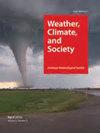The impact of extreme precipitation events and their variability on climate change beliefs in the American public
IF 1.9
4区 地球科学
Q3 ENVIRONMENTAL STUDIES
引用次数: 0
Abstract
Although scientists agree that climate change is anthropogenic, differing interpretations of evidence in a highly polarized sociopolitical environment impact how individuals perceive climate change. While prior work suggests that individuals experience climate change through local conditions, there is a lack of consensus on how personal experience with extreme precipitation may alter public opinion on climate change. We combine high resolution precipitation data at the ZIP code level with nationally representative public opinion survey results (n = 4,008) that examine beliefs in climate change and the perceived cause. Our findings support relationships between well-established value systems (i.e., partisanship, religion) and socioeconomic status with individual opinions of climate change, showing that these values are influential in opinion formation on climate issues. We also show that experiencing characteristics of atypical precipitation (e.g., more variability than normal, increasing or decreasing trends, or highly recurring extreme events) in a local area are associated with increased belief in anthropogenic climate change. This suggests that individuals in communities that experience greater atypical precipitation may be more accepting of messaging and policy strategies directly aimed at addressing climate change challenges. Thus, communication strategies that leverage individual perception of atypical precipitation at the local level may help tap into certain “experiential” processing methods, making climate change feel less distant. These strategies may help reduce polarization and motivate mitigation and adaptation actions.极端降水事件及其变异性对美国公众气候变化信念的影响
尽管科学家们一致认为气候变化是人为的,但在高度两极分化的社会政治环境中,对证据的不同解释会影响个人对气候变化的看法。虽然先前的研究表明,个人经历气候变化是由于当地条件造成的,但对于极端降水的个人经历如何改变公众对气候变化的看法,人们缺乏共识。我们将邮政编码级别的高分辨率降水数据与具有全国代表性的民意调查结果(n=4008)相结合,调查了人们对气候变化和感知原因的看法。我们的研究结果支持了既定的价值体系(即党派、宗教)和社会经济地位与个人对气候变化的看法之间的关系,表明这些价值观对气候问题的意见形成有影响。我们还表明,在当地经历非典型降水的特征(例如,比正常情况更多的可变性、增加或减少的趋势,或高度重复的极端事件)与人们对人为气候变化的信心增加有关。这表明,经历过更多非典型降水的社区中的个人可能更容易接受直接旨在应对气候变化挑战的信息和政策策略。因此,利用个人对当地非典型降水的感知的沟通策略可能有助于利用某些“经验”处理方法,使气候变化感觉不那么遥远。这些战略可能有助于减少两极分化,并推动缓解和适应行动。
本文章由计算机程序翻译,如有差异,请以英文原文为准。
求助全文
约1分钟内获得全文
求助全文
来源期刊

Weather Climate and Society
METEOROLOGY & ATMOSPHERIC SCIENCES-
CiteScore
3.40
自引率
13.60%
发文量
95
审稿时长
>12 weeks
期刊介绍:
Weather, Climate, and Society (WCAS) publishes research that encompasses economics, policy analysis, political science, history, and institutional, social, and behavioral scholarship relating to weather and climate, including climate change. Contributions must include original social science research, evidence-based analysis, and relevance to the interactions of weather and climate with society.
 求助内容:
求助内容: 应助结果提醒方式:
应助结果提醒方式:


